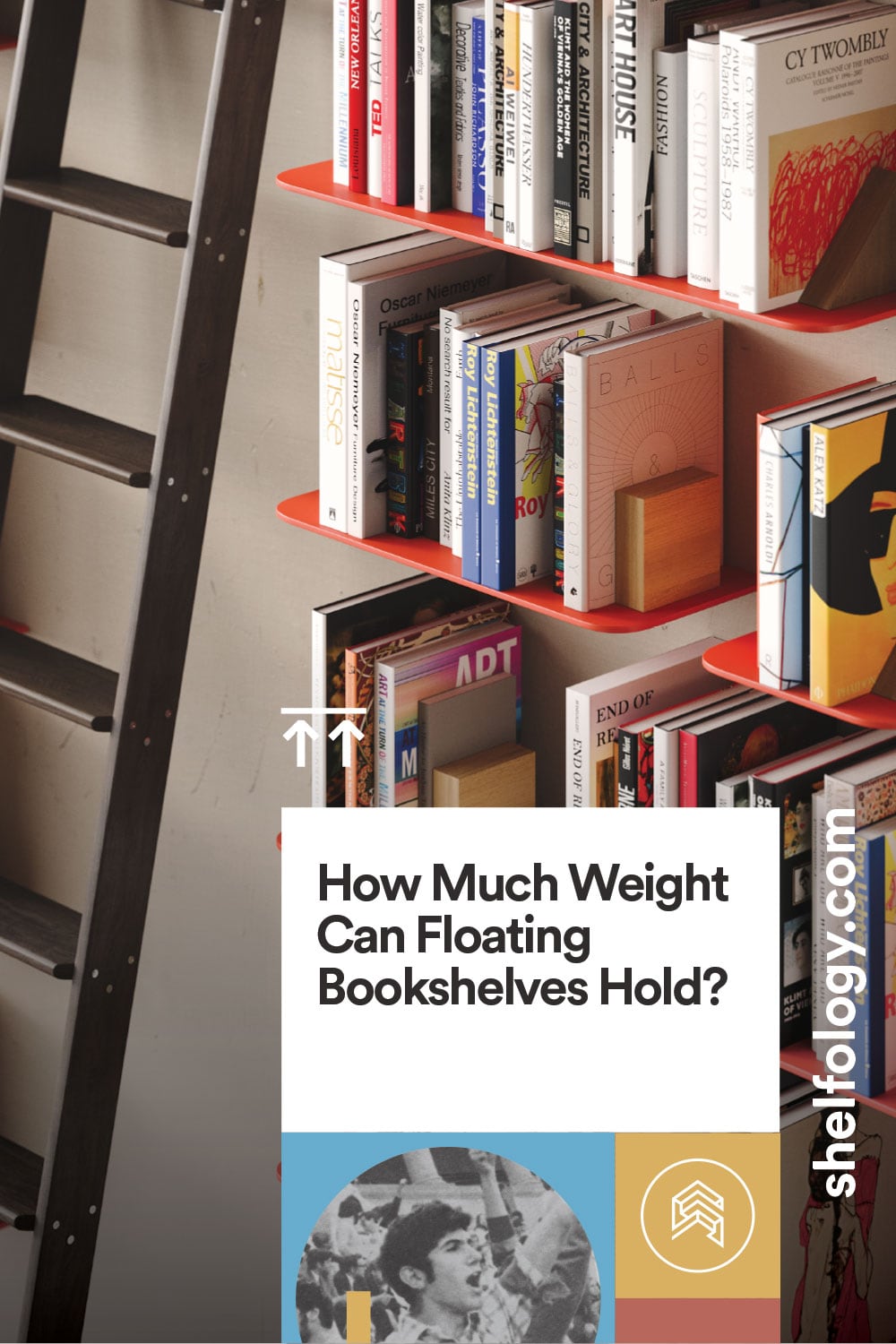At Shelfology, we know that all things floating shelves are on-trend, and floating bookshelves are no exception. In fact, whether or not our floating shelves can hold up a library of books is one of the questions most frequently fielded by our customer service team.
TLDR: A floating bookshelf can generally support up to 50lb for every spot where the floating shelf bracket is fastened to a stud, piece of blocking, or masonry. However, the quality of your floating shelf bracket and the shelf itself will drastically affect the real-world weight limit.
In this post, we bring to you a guideline for how much weight a floating bookshelf can hold, what factors play into this final number, and some things you can do to make your floating bookshelves more secure. Let’s dig right in, fellow shelf nerds!

Table of Contents
- What Is a Floating Bookshelf?
- What’s the Difference Between a Floating Shelf and a Floating Bookshelf?
- Why is Weight Such an Important Factor with Floating Bookshelves?
- 5 Factors That Determine How Much a Floating Bookshelf Can Hold
- So, How Much Can a Floating Bookshelf Hold?
- Increase Your Floating Bookshelf Weight Capacity to the Nth Degree with Concrete Blocking
- Go Reclaim Your Walls!
What Is a Floating Bookshelf?

A close cousin to the floating shelf, the floating bookshelf is a masterpiece of wall decor that artfully defies gravity. Meant to house your collection of books, floating bookshelves are sturdy wall shelves that have no visible shelf hardware. Many interior decorators favor floating bookshelves because they don’t take up any floor space, and thus can be hung above and below other things, leaving ample space for artwork, cabinets, and other decorative pieces.
What’s the Difference Between a Floating Shelf and a Floating Bookshelf?

You’ve probably seen floating shelves everywhere by now; they’re a hip, fashionable way to elevate your already-cool space and take it to the next level. We didn’t think floating shelves could get any more radical until we discovered floating bookshelves. These shelves were designed with books in mind, and many have multiple levels. Some floating bookshelves are even low-profile enough to make your books look like they aren’t sitting on a shelf at all!
Why is Weight Such an Important Factor with Floating Bookshelves?

The average hardcover book weighs anywhere between 1 and 5 lbs. Do the math: Just 50 books will weigh anywhere from 50 lbs to upwards of 250 lbs! In a word: books are heavy (duh!), and floating bookshelves need to be designed and build to support gnarly weight capacities. With properly designed and installed shelving, you can store whole encyclopedias without worrying about damage to your wall or your books falling. However, as we mentioned, certain factors must be met to ensure a sturdy floating bookshelf.
Factors That Determine How Much a Floating Bookshelf Can Hold:
The following factors will play into how much your floating bookshelf can hold. At the end of the day, always follow the weight limitations on your shelf’s box and instructions. Do not exceed this weight limit, or you might run into some sagging and tipping in your floating shelves. Furthermore, you might even be putting your items and family members in danger.
1. The Material Your Floating Bookshelf Is Made Out Of
The makeup of the actual horizontal surface is going to be one of the biggest factors that play into how much your shelf can hold. If you think about it, you could have the strongest brackets in the world; if your shelf is made out of tissue paper, it’s not going to hold anything.
When you start thinking about what shelving you want to use, keep in mind your end goal. Will you be stacking tons and tons of books? If so, go for solid hardwood like cherry, oak, or walnut. Do not rely on particle or MDF boards to hoist your collection of encyclopedias.
2. The Depth of the Floating Bookshelf
For floating bookshelves, the depth probably isn’t going to be an issue—you’ll find shelves just deep enough for a stack of books. However, it’s important to keep in mind that deeper shelves can hold more weight, but only if they are installed properly. They may also be more prone to tipping forward.
3. The Floating Bookshelf Hardware
Most floating shelf kits available on the market are good. You’ll be hard-pressed to find a shelf kit that lacks appropriate hardware for a simple, lightweight job. However, if you mean business, it’s in your best interest to spend a little bit more on high-quality steel that will rock your world.
For example, our contractor-grade shelf hardware will easily get the job done for you. Plus, you can rest easy at night knowing you won’t wake up to sagging, sad-looking bookshelves (and a disorganized mess on the floor).
Related Radness:
4. How the Hardware Is Attached to the Wall
You could have the strongest, sturdiest bracket in the whole world, but if you attach it improperly, it’s essentially useless. These brackets were designed with three applications: drywall anchors, studs, and masonry. You should never rely on a simple screw into drywall—it will never end well. Use the right tool for the job and the right hardware for your wall. For more info, check out these related articles:
5. How You Balance the Load
As you might expect, shelves can have problems with load balancing. For example, a long, budget shelf with no center supports should not have the majority of its weight in the middle of the shelf. This will cause bowing and sagging in the boards. However, if you place your books in a clever manner, you can get much more weight onto them without causing problems.
So, How Much Can a Floating Bookshelf Hold?

Generally speaking, a floating bookshelf can hold up to 50 lbs per sturdy attachment point, (into a stud, piece of blocking, or masonry). Drywall anchors are iffy (at best), and we don’t recommend you rely solely on these to get you by—it’s asking for trouble.
So, for example, a floating bookshelf with two levels and four attachment points into studs could feasibly hold up to 200 pounds. However, depending on the quality of all of those materials, you may find that 25 pounds in the center of one of those shelves may cause your shelf to sag or even break.
Increase Your Floating Bookshelf Weight Capacity to the Nth Degree with Concrete Blocking

Blocking is a technique that attaches another full piece of wood in between two studs. This board is secured with wood screws into the two studs on each side, creating a much sturdier attachment point for your shelf’s intermediary drill points. This eliminates your need for drywall anchors entirely. The shelf nerds here at Shelfology always recommend blocking if your shelf needs to be off-center and doesn’t line up with your studs properly. We wrote about this topic extensively in our world-famous “How Much Weight Can a Floating Shelf Hold?” post.
Related Reading:
Go Reclaim Your Walls!
So, what’s your next up-and-coming home improvement or redecorating project? Perhaps a floating bookshelf project is now in the works. Whatever it is, get out there and own it, Shelf Cadets!
Related Radness:




